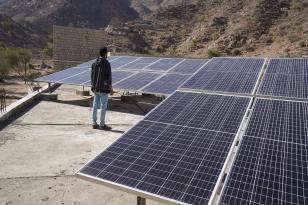Solar Interventions in Yemen

Solar Interventions in Yemen - Supporting Resilient Livelihoods and Food Security in Yemen
pdf (0.5MB)
DownloadSolar Interventions in Yemen
August 2, 2021
Yemen has the lowest level of electricity connection in the Middle East - 40 per cent, compared with around 85 per cent in the region. The frequent failure of the public grid has forced Yemenis to rely on alternative power and light sources such as diesel generators and kerosene lamps. These alternatives pose detrimental effects on the environment, and come at a high cost for Yemeni households.
With support from the European Union (EU) and Swedish International Development Cooperation Agency (SIDA), UNDP and its local partners have installed 425 solar off-grid systems for a range of public services including schools, healthcare centres, and public offices, the Supporting Resilient Livelihoods and Food Security in Yemen (ERRY II) project. These systems allow rural and poor crisis-affected communities access a cheaper, cleaner and environmentally friendly source of energy.
UNDP’s solar activities have also provided new sustainable livelihoods opportunities – through solar micro-grid management and maintenance teams – and contributed to improved environment protection and climate security, by saving 26,203 tons of Carbon Dioxide (CO2) emissions from releasing into the atmosphere.

 Locations
Locations




